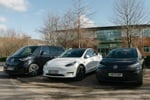Environmental creditionals may be what the manufacturers like to promote but the bottom line for buyers is running costs, so environmentally friendly is popular for economic reasons rather than ethical.
Dealers tell us that used car customers are now very switched on to the impact of CO2 on their VED.
The impact of this can be illustrated by how difficult it now is to shift a Ford Focus 1.8 TDCi when there is a 1.6 available delivering only five bhp less but with VED £100 lower.
In terms of residual values, as we head toward Euro 5 older engine models will suffer.
The usual pattern will apply – the ‘better’ car will be accepted as the norm while those behind the curve will fall further back.
So don’t expect stronger residual values for more environmentally benign vehicles – but do expect weakening demand and prices for those with higher CO2 than the newer breed.
Zero to £35 VED is proving to be a very popular enticement and a modern 1.2 litre engine is perfectly sufficient for a very large proportion of today’s used car buyers where a few years ago everyone preferred the comfort and performance of a larger engine.
Changing perceptions in the car market takes a long time and it is interesting that independent dealers in particular remain wary of hybrids.
Despite the fact that Toyota and Lexus have shown a miniscule burn rate on their warranties there still remains the fear that a battery may fail and wipe out any profit on that and the next several trades.
Consequently a three-year-old mid-spec Prius with typical mileage retains 34.5% of its cost new while an equivalent Golf diesel retails 48.5%.
The Prius therefore remains on the level with a comparable Focus, which retains 34.2%.
It will take some time for larger hybrids to gain really significant momentum because the benefits are not especially tangible.
The dominant model from Lexus is seen as more of a statement than offering a significant economic benefit over an efficient diesel.
The Auris HSD is an interesting entrant because it is really the first hybrid that doesn’t stand out as very different from the mainstream.
There have been reports to us of some dealers easily converting customers looking at a conventional new Auris into the hybrid – but interestingly they are having to point the car out as prospects don’t tend to come in to investigate them.
Then there are other dealers who report that it is their hardest model to sell.
Monitor continues to take a generally cautious view on hybrids in general with little or no premium over efficient conventional equivalents until perceptions have shifted more fundamentally.
But in the case of Auris it is forecast to retain 3.6% more than the petrol model, based on CAP’s view that buyers will find the design more immediately acceptable than more typical hybrids.














Login to comment
Comments
No comments have been made yet.